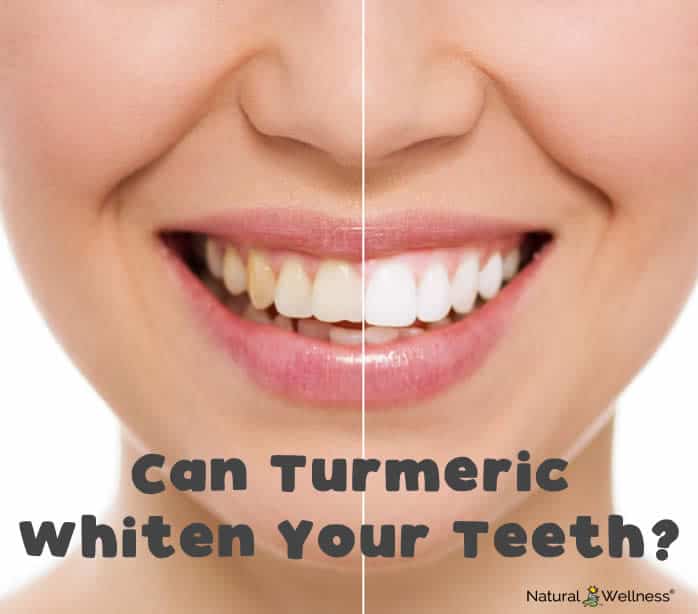

Did you know that turmeric is extremely affordable and easy to prepare at home, making turmeric based toothpaste and mouthwash an attractive solution for whitening, especially when compared to the plethora of expensive and chemical based teeth whitening regiments and their side-effects?
But before you stock up on turmeric powder, let’s get some of the most common questions out of the way.
- Will turmeric stain teeth?
- Does turmeric make teeth yellow?
No, and no. These notions are scientifically unfounded, despite turmeric’s beautiful orange and yellow hue.
However, turmeric does have mildly abrasive properties so it should not be used every day like normal toothpaste and mouthwash (3). We recommend using a turmeric based oral product once a week or every other week to naturally whiten your teeth in conjunction with daily oral care such as brushing and flossing.
What Does Science Say About Turmeric?
In general, there is a larger body of evidence supporting tumeric’s therapeutic and anti-inflammatory properties. Not only is turmeric a promising cancer treatment, but experts describe turmeric as a “safe, nontoxic, and effective alternative for many conventional drugs.” So it stands to reason why turmeric is effective against the “clinical inflammatory parameters of gingivitis.”
Can Turmeric Be Used to Whiten Teeth?
While more science regarding turmeric’s efficacy as a whitening agent is necessary, here’s what we do have. Turmeric and, by extension its active ingredient, curcumin, were recently the subject of a clinical trial comprised of 150 participants who, for 28 consecutive days, used either a curcumin based mouthwash, a placebo mouthwash, or a traditional chlorhexidine mouthwash. (Cholrhexidine mouthwash is a medication is used along with regular tooth brushing/flossing to treat gingivitis.)
Researchers concluded that their clinical trial “proves the antiplaque and antigingivitis efficacy of curcumin mouthwash.”
Side note: chlorhexidine mouthwash is not so great. While chlorhexidine both kills and inhibits the growth of bacteria in the mouth, it does so in such an aggressive way that the side effects can often be much worse than having stained teeth (2).
Common side effects of chlorhexidine and products that include it can include:
- sore gums
- dry mouth
- and even staining of gums and teeth, which is both ironic and tragic (2).
In general, turmeric and curcumin have always been staples of non-western medicine systems for centuries, but growing empirical research and data over the last decade is getting hard for the west to ignore. In a wide review, The AAPS Journal found that “curcumin has shown therapeutic potential against a number of human diseases. Common to all of these studies has been the safety, tolerability, and non-toxicity of this polyphenol, even at doses up to 8g per day.”
Is Turmeric Bad for Teeth?
Good question. Turmeric is totally safe to use on your teeth, just don’t do it on a daily basis. Turmeric is a natural abrasive and can thus corrode the enamel that protects our teeth if overused.
At most you should use a curcumin toothpaste or mouthwash once a week to get the whitening benefits and keep your enamel healthy. Also, once a week oral turmeric use will not stain or yellow your teeth at all.
Main Takeaways and Recipes
Below are a few simple and helpful home recipes – one for a turmeric based mouthwash and another for a toothpaste. Both are pretty straightforward.
Turmeric Toothpaste:
- 1 tablespoon coconut oil
- 1 teaspoon finely ground turmeric powder
- 2 drops peppermint oil
Combine all of the above ingredients in a bowl until they become a paste. The coconut oil is especially useful for its own antimicrobial and antibacterial properties, in addition to adding some viscosity and helping emulsify the paste (4).
Once your paste is thick enough you can dip your toothbrush bristles into the paste and brush your teeth for a minute or two to lift off surface stains.
This recipe is also fun because it’s very easily augmented. If you don’t like the taste of turmeric, which can be a bit peppery and even have a little kick to it, you can change the flavor with baking soda or a few drops of citrus or your favorite essential oil. If you want to up the ratios and make a larger batch, you can save the excess in an airtight container and refrigerate!
However, we once again want to remind everyone that turmeric is a mild abrasive and could potentially corrode dental work such as fillings and crowns. Don’t use turmeric oral care products more than once per week and talk to your dentist about turmeric if you have any work in your mouth that may be negatively impacted.
Turmeric Mouthwash
In 1 cup of hot water, steep 3 to 4 cloves for about an hour. Remove the cloves and add the following:
- 1/2 teaspoon calcium carbonate
- 1/2 teaspoon L-Arginine
- 1/2 teaspoon turmeric
- 1/2 teaspoon baking soda
- 1 cup water
Whisk or blend all of these ingredients together and use 1 tablespoon for a quick rinse before bed. And just like with the toothpaste, this should be a once-a-week thing. The mixture should last in the fridge in an airtight container for several weeks.
2 More Home Remedies for Teeth Whitening
While we’re going over home natural remedies, it may be worth mentioning a few others for teeth whitening that are fun and easy to try in addition to your daily brushing and flossing.
- Activated charcoal is thought to lift impurities off of other substances, including teeth. Activate your charcoal with filtered water and brush as if you were using normal toothpaste.
- Baking soda and lemon juice is also a popular home whitening trick and possibly less expensive than turmeric. If you get the lemon juice ratio just right it will to balance out the alkalinity of the baking soda and lift stains from your teeth (5). However, be careful not to overdo it with this, as the citrus can be harsh on your enamel just like turmeric.
Conclusion
All in all we recommend turmeric for teeth and gums. It’s natural, non-toxic, inexpensive and easy to prepare (1).
If the home remedy thing isn’t up your alley, you can always take a high quality turmeric supplement like Natural Wellness’s Turmeric 95 to at least get the anti-inflammatory effects into your system.
As always, be sure to consult your doctor before augmenting your routines. While turmeric is a great way to whiten, it isn’t for everyone, so check to make sure that turmeric oral care is right for you.




